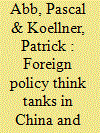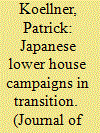| Srl | Item |
| 1 |
ID:
142222


|
|
|
|
|
| Summary/Abstract |
The role of foreign policy think tanks (FPTTs) in policy-making has received substantial scholarly attention, with most studies focusing on US-based organizations. In this article, we seek to address this spatial bias by discussing the development and roles of FPTTs in two East Asian countries, China and Japan. China today hosts the second-largest think tank scene in the world, and many FPTTs have received influxes of funding and increased the academic qualifications of their staffers in recent years. Japan also hosts a sizable array of think tanks, but many of them operate on a for-profit basis and do not focus on public policy issues; Japan has very few genuine FPTTs. In both countries, FPTTs are in many ways linked to the government. While they seek to inform and influence foreign and security policy as well as public discourse on international affairs, they usually do not act as agenda setters. By examining the recent case of constitutional reinterpretation in Japan, which aimed to enable collective self-defence, we show how Japanese public intellectuals, including think tankers, helped to legitimize this controversial move and how Chinese FPTTs reacted publicly by providing media commentary in support of the official government line.
|
|
|
|
|
|
|
|
|
|
|
|
|
|
|
|
| 2 |
ID:
086138


|
|
|
|
|
| Publication |
2009.
|
| Summary/Abstract |
Electioneering for the Japanese Lower House has undergone significant changes in recent years. While voter mobilization strategies still figure prominently in the local-level campaigns of individual candidates, political parties increasingly use voter-chasing strategies at the national level. Such chasing strategies, whose manifestations in Japan have so far included the manifesto and the media-spin approach, target in particular the growing number of independent voters. The concurrence of elements of continuity and change in electioneering has led to a "hybridization" of Lower House election campaigns. The article examines this phenomenon in the light of newer conceptual and theoretical approaches to electoral politics in democratic settings.
|
|
|
|
|
|
|
|
|
|
|
|
|
|
|
|